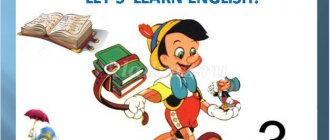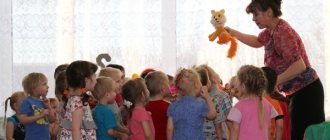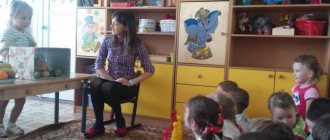“Entertaining material for Russian language lessons in primary school”
Author: Vagabova Madina Magomedovna
Introduction
The native language at school is a tool of cognition, thinking, and development. It has rich opportunities for creative enrichment.
Through language, the student masters the traditions of his people, their worldview, and aesthetic values. Through language he becomes familiar with the treasures of world literature. Through language he expresses his thoughts, feelings, expressions of will. Language introduces a child to social life, gives him the opportunity to communicate with adults and friends. Basic concepts are also learned through words. The game is inherent in a person at the level of instinct. At any age, a person loves to play. For a child, play plays an important role, perhaps the main role in his development, because It is in the process of play that his idea of the world around him, of social relationships is formed and the concept of the place he occupies in society is formed.
Pedagogical basis for teaching Russian language
in a playful way
All the basic didactic principles inherent in pedagogy are also applied in the methodology of teaching the Russian language. But here there is some specificity in their manifestation.
Important for the development of the methodology is the development in didactics of ways to organize the cognitive activity of students. The question was raised that, along with receptive and reproductive activities (perception and reproduction of material), a significant place is given to the child’s productive, search or partially search activity. Only in the course of such activities of students can the foundations of independent thinking, the beginnings of creativity be formulated and, in general, contribute to the development of the personality of each student. Further development of the relationship between learning and development put forward within the framework of a unified psychological and pedagogical concept led to the emergence of a new theory in didactics - the theory of problem-based learning. The essence of this type of training is as follows:
“A significant part of knowledge is not transferred to students in a ready-made form, but is acquired by them in the process of independent cognitive activity in a problem situation.” Thus, from didactics the concepts of problem situation and cognitive tasks came to the methodology. In the process of gaming activity, the teacher creates an artificial (educational) problem situation, in the process of solving which he solves the assigned cognitive tasks.
One of the aspects of the motivational sphere of educational activity is interest in learning. It is closely related to the level of formation of educational activities. To generate interest in learning, you need to create a motive and then open the students to the possibility of finding a goal. “An interesting academic subject is an academic subject that has become the sphere of the student’s goals in connection with one or another motivating motive.”
Sometimes, the main feature of interest is emotional coloring, connection with the child’s emotional experiences. Of course, this is especially important, but still, to maintain the sustainability of interest, the formation of educational activity is necessary, as well as the associated ability to independently solve educational goals.
Entertaining plays an important role in cultivating interest in students, especially in the lower grades. It creates an atmosphere of interest and a sense of anticipation. The degree of interest depends on the nature of attention in the lesson, its activity, as well as the creative enthusiasm of the students.
The interests of children of primary school age are still closely related to play-based learning activities. They love learning activities that have elements of play that they can succeed in and that they can do. But gaming activities, which certainly contribute to the development of interest in the lesson, should not turn into an end in themselves.
These are the linguistic, psychological and pedagogical foundations of the methodology for teaching the Russian language in primary school through play activities.
Didactic requirements for gaming activities
in Russian language lessons
Even the ancient Greeks said that the root of teaching is bitter. But why teach with bitter and useless words what you can learn with a smile. If it is interesting to construct a lesson, if you try to evoke amazing curiosity, excitement, delight, and joy in the eyes of children, then the root of the teaching can replace its taste and become sweet. An entertaining science - entertaining linguistics - will help the teacher with this.
The value of textbooks, scientific works, all kinds of smart and valuable books is undeniable. But sometimes they study the material in such a dry, boring way... There are, of course, quite a few textbooks where the material is presented in an interesting, visual, fascinating, entertaining way.
Entertaining is not the same thing as verbal, entertaining, funny. Entertaining is a property with which you can not only interest, but also captivate a difficult, seemingly “dry” subject.
It is not so easy to make the science of language entertaining, although in the life of any person, of any nation, language occupies the main place - it is the most important means of human communication. But how do they treat him? For some, language is something taken for granted; they use it, master it, but do not think about its essence and properties.
Others, on the contrary, are interested in its structure, the origin of individual words, the specifics of their formation and use. Sometimes they look for answers to questions in school textbooks. But there is no answer there. There are answers in special reference books, but, often, for a non-linguist, they are so complicated that it is impossible to understand. And then entertaining grammar comes to the rescue.
For elementary school students, entertaining and playful tasks play a paramount role.
How to make a lesson interesting, tasks entertaining - more than one generation of teachers has been working on this issue. To achieve this, the teacher must be:
- patient in dealing with children;
— we tolerate their ignorance and misunderstanding;
- know the features of the psychophysical development of younger schoolchildren: attention and memorization are still weak; children are very emotional and impressionable; will and consciousness are still poorly developed; lack of perseverance, children are mobile; increased fatigue, etc.
You always need to understand the golden rule: knowledge acquired without interest is not colored by one’s own positive attitude, emotions, and does not become useful - it is dead weight.
A.S. Makarenko attached great importance to the play of children and compared it with the work of adults. “A good game,” he said, “is like a good job, and a bad game is like a bad job. In every game there is, first of all, a working effort of thoughts.”
In language games, there must undoubtedly be “thought effort”. Games should help expand and strengthen oral language skills; they should be not only entertaining, but also educational.
In didactic educational games, the presence of knowledge and learning skills comes to the fore.
The essence of didactic games is to solve cognitive problems posed in an entertaining way. By mastering or refining this or that program material in a didactic game, children learn to observe, compare, show intelligence, resourcefulness, and most importantly, develop communicative activity.
Each didactic game has its own structure:
the purpose of the game is educational;
rule of the game - ways to solve the problem;
game actions - implementation of the task;
end of the game;
the result of the game and the teacher’s assessment of the activities of the game participants - the assessments are correct, even liberal, soft.
The success of the game depends on a clear explanation of the rules.
Engagement can manifest itself in various forms:
- in an unexpected formulation of the question;
- in creating a problematic situation;
- in an unusual form of conducting a lesson (in the form of an interview, travel, dramatization, etc.).
The following requirements apply to the entertainment used in Russian language lessons:
1. assignments must correspond to the psychophysical age characteristics of the student;
2. tasks must be executable;
3. assignments must correspond to the grammatical topic being studied;
4. the game should not be an end in itself;
5. the teacher should not interfere with the game, but only correct it;
6. You cannot make negative remarks during the game; on the contrary, you must encourage the participants in the game process in every possible way;
7. playing a game or performing an entertaining task should usually be carried out at the stages of consolidation, repetition, and generalization of educational material;
8. the game should not take much time
All language games can be divided into several groups:
1. graphic games - the main goal of which is to master the meanings, spellings and uses of all letters of the Russian alphabet (note: graphic games can be played when children have learned all the letters of the alphabet and can read and write fluently);
2. vocabulary games - the main goal is to enrich students’ vocabulary, improve the lexical structure of their speech;
3. spelling games - strengthening the skills of spelling words, morphemes; such games are aimed at improving the knowledge of those spellings that have already been studied, for example, spelling unstressed vowels after hissing ones, spelling unstressed vowels at the root of a word, spelling a capital letter, b and b signs, voiced and unvoiced consonants, rules for hyphenation, etc.;
4. grammar games, instilling skills in the practical application of the rules of phonetics, spelling, word formation, morphology, syntax
5. games that develop students’ coherent speech, the ability to use a variety of speech means in a given situation, the ability to use the rules of speech etiquette, etc.;
6. logic games - the main goal of which is to promote development
logical thinking of students, the ability to isolate an object from a set of similar ones, establish connections between objects of reality, and also include an object in the category of homogeneous ones. Logical games are a test of a person’s intellectual abilities. The logic of thinking should be taught in all lessons, but in Russian language lessons first of all, since language is a means of expressing logically concepts, judgments, and conclusions.
The forms of gaming and entertaining tasks are varied. Amazing events should happen during the lessons: famous fairy-tale characters come to visit the children - Pinocchio, Dunno, Carlson, Winnie the Pooh, Cheburashka, and strange animals. They ask the guys for help, advice, and talk about their problems. The game is the beginning of a difficult path to knowledge. It helps students learn grammatical material, develops curiosity, initiative, and emotional memory. During the game, the psychological state of students improves, tension is relieved, and an atmosphere of trust and ease is created.
But we must remember that play does not precede learning and does not alternate with it. A game is a form of organizing educational activities, a form of monitoring the knowledge and skills of students.
Games can be:
instrumental (manipulation of various objects with commentary on one’s actions);
imitation - students perform imaginary actions, but without objects;
competition games. Such games are played by teams. Their task is to achieve extra-linguistic and extra-methodological results;
linguistic or verbal games - games with and with words;
role-playing games - micro-studies, macro-studies (dramatizations);
business games as a type of role-playing games. The main goal is to expand the problematic task, to establish interaction and relationships with partners;
intellectual games such as “Scrabble”, “Who wants to become a millionaire?” and so on.
Games can also be organized according to plot pictures. The picture seems to be the starting point in the game. Students name the characters and make up dialogues for them.
You can also organize the game “Cardboard Lotto”, compiling fairy tales based on dynamic pictures, etc. But such games should be aimed at reinforcing some topic in the Russian language. For example, “Cardboard Lotto” on the topic “Indeclinable nouns.”
Children are especially attracted to role-playing games, where they can move freely, take initiative, and communicate. Children love to draw. This love for the visual arts can also be used in Russian language lessons. For example, when studying unstressed vowels, it is suggested to draw objects whose names contain this spelling.
Even starting such a seemingly boring lesson as penmanship, you can add an element of entertainment. “Children, today I will tell you one secret,” the teacher says in a whisper, “you and I will sail on a ship to the country of Linguinia. But only one can get there who beautifully writes two lines of the letter L and names 5 words - the names of nouns beginning (ending) with the letter L.”
So, entertaining didactic games are a teacher’s creative laboratory. And you can own it only if you love children, love your work as a teacher, love and admiration for the beauty and power of our one language.
How to make a Russian language lesson interesting and entertaining
and your child’s favorite subject?
One of the most effective means of arousing interest in Russian language classes is a didactic game. The goal of the game is to awaken interest in knowledge, science, books, and learning. At primary school age, play, along with learning, occupies an important place in the development of the child. When children are included in a didactic game situation, interest in educational activities increases sharply, the material being studied becomes more accessible to them, and their performance increases significantly.
After all, the fact that play is part of the educational process is no secret to anyone. The game helps the formation of phonemic perception of words, enriches the child with new information, activates mental activity, attention, and most importantly, stimulates speech. As a result, children develop an interest in the Russian language. Not to mention the fact that didactic games in the Russian language contribute to the formation of spelling vigilance in younger schoolchildren.
Over the course of several years of working in primary classes, I observed that Russian language classes do not always arouse interest among students. Some children find it a boring subject. Reluctance to study the Russian language gives rise to illiteracy. I thought about how to arouse interest in classes, how to improve writing literacy. I re-read a lot of literature, analyzed my lessons and came to the conclusion that it is possible to awaken interest in the Russian language if you systematically accumulate and select fascinating material that can attract the attention of every student.
We live in an era of verbal information. Language depreciates, we begin to lose the sense of its beauty and uniqueness. At the same time, the Russian language is an amazing asset of the people. And we need to take care of it, appreciate it, and teach schoolchildren to this.
School practice suggests that there is a special play pedagogy that provides more relaxed emotional communication and equal creative interaction between a child and an adult.
Playful activities in Russian language lessons are activities to preserve the ecology of the language, this is the desire to develop the child’s natural speech. Participation in games relieves the child’s inferiority complex, fear, and shyness.
The game affects the emotional sphere of the child, and he perceives the situation easier, not only with his mind, but also with his feelings.
And therefore, games contribute to the development of creativity and create a good mood. comments powered by HyperComments





